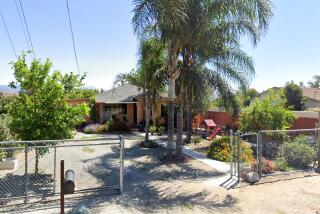No Bulls : Rowdyism: The border city of Tecate ends its annual running of the bulls, which often resulted in outbreaks of drunken rowdyism by the throngs attracted to the event.
- Share via
TECATE, Mex. — Seven years ago, about 2 dozen people, standing elbow to elbow on the streets of this tiny town, were trampled when a herd of bulls ran them over. Many were injured, none severely.
The crowd, made up largely of American college students, kicked, punched and hurled bottles oozing with the local brew, Tecate beer. Their target was the bulls, whose stampede on the narrow, glass-encrusted streets launched a melee.
To make matters worse, a temporary stadium set up for the running of the bulls collapsed in October of 1985, injuring more than 100 spectators out of the crowd of 3,000 that had gathered to watch a bullfight. A witness described how the screaming revelers fell “like a row of dominoes.”
Wary of the annual onslaught of damage by drunken Americans and fearful of yet another disaster, Tecate has abandoned its annual bullfight as well as the Pamplonada . The latter was Tecate’s variation of the running of the bulls first made famous in Pamplona, Spain.
Mayor Ruben Adame, who took office at the end of last year, seems relieved to have the wildness behind him.
Such events require “a lot of organization,” Adame said in announcing his decision early this month. “You need a lot of security and sanitary facilities. . . . You have about 20,000 people coming into a small city,” whose population is only about 80,000.
The Pamplonada began in 1979 and became more and more unruly and difficult to handle, said civic leader Norma Aguilar Caballero, who said the bulls drew larger crowds each year.
Aguilar conceded that, like many cities in nearby Southern California, Tecate is conscious of its image. She said drunken, rowdy hooliganism was something it longed to leave behind.
She described Tecate as being among the most tranquil of Mexican border towns, and, rather than being something they celebrated, the Pamplonada had emerged as something its citizenry loathed and feared.
“We want to change the impression that the Pamplonada left,” Aguilar said. “The event attracted a lot of undesirable people who wanted to do what they were not permitted to do in their own country, like drinking in public.”
As an alternative, Tecate has begun to hype its Feria Campestre and Industrial Exposition, a small fair scheduled from July 14 through July 29. The fair will feature an industrial show by Tecate’s thriving maquiladoras , a charreada (a Mexican rodeo featuring children and adults performing on horseback), as well as mariachi music and food.
Mayor Adame said the running of the bulls and the bullfight ceased to be something that Tecate could control. This time, he hopes business leaders are attracted to a celebration of the town’s exports, such as beer, mineral water, furniture, clothes and toys.
He expects about 100,000 people to attend the fair, which will also involve local Indian tribes, the Pai-Pai (from Ojos Negros in Ensenada) and the Cucapah (from San Felipe).
Adame said he asked those business leaders who wanted the bullfight and running of the bulls continued to provide assurances “that visitors would be comfortable, that the animals would not be mistreated and that businesses and homes would not be damaged.”
He said he received not a single response of reassurance. Animal rights groups, meanwhile, have lauded the decision.
More to Read
Sign up for Essential California
The most important California stories and recommendations in your inbox every morning.
You may occasionally receive promotional content from the Los Angeles Times.













